- Home
- Various Authors
Brides of Penhally Bay - Vol 1 Page 4
Brides of Penhally Bay - Vol 1 Read online
Page 4
His hand moved, the softest caress, and he opened his eyes, lifted his head and met her eyes.
‘I felt it move,’ he said, and there was wonder in his voice, and joy, and pride.
And for the first time she felt the tension ease and some of the dread fade away.
‘It’ll be all right, Lucy. Don’t worry. I’ll look after you.’
‘We aren’t getting married, Ben.’
‘Don’t close your mind to it,’ he said softly.
‘It’s too soon.’
‘Of course it is—but it’s one of our options.’
Ours?
She would have moved away from him, but he had her pinned up against the sink and in the narrow kitchen there was nowhere to go. So she turned her back to him, but it didn’t help because he simply moved up closer, sliding his arms around her, resting both hands on her tummy and drawing her gently back into his warm embrace. ‘Don’t be scared.’
‘I’m not scared,’ she lied. ‘I just don’t like you turning up out of the blue and telling me what to do.’
‘Out of the blue? I hardly abandoned you, Lucy. The last conversation we had, you told me it wasn’t going to work. Too much baggage.’
‘And you agreed.’
‘So I did,’ he said thoughtfully. ‘But that was then, and this is now, and things are different. The baggage certainly is. I can’t let you face your father alone.’
‘And you really think you being there, telling him you’re the baby’s father, will help?’
He sighed and moved away at last, giving her room to breathe, to re-establish her personal space and gather her composure around her like a security blanket.
‘Come on,’ he said. ‘You haven’t finished your sandwich. Come and sit down and put your feet up and tell me what you were planning.’
She laughed wryly. ‘I didn’t have any plans,’ she confessed, feeling suddenly lost again. ‘I was just winging it, getting through a day at a time. And Dad hasn’t really asked very much about the baby’s father. Just how could I have been so silly and that I’d have his support. He wants me to move back in with him, but I don’t want to.’
‘Lucy, you can’t stay here,’ he said, his voice appalled, and she felt her mouth tighten.
‘Why not? Don’t come in here and start insulting my home, Ben.’
‘I’m not insulting your home, sweetheart, but look at it. It’s tiny, and it’s up a steep hill and a narrow flight of stairs, with no parking outside—where do you keep your car? The surgery? That’ll be handy in the pouring rain when you’ve got a screaming baby and all your shopping.’
She bit her lip, knowing he was right and yet not wanting to admit it. Of course the flat wasn’t suitable for a baby, and she’d been meaning to find somewhere else, but anything rented was usually in holiday lets in the summer, and she couldn’t afford those rates, not unless she went back to work, and buying somewhere in the village on a part-time salary probably wasn’t an option either.
‘I don’t suppose he’s any nearer to accepting that I wasn’t to blame for your mother’s death?’ he suggested, and Lucy shook her head.
‘I don’t think so. He wasn’t very pleased this morning when Kate announced that it was you coming.’
A frown pleated his brow. ‘Really? But it was decided weeks ago. Kate said everyone was fine with it. I assumed he must know.’
She met his eyes, and realisation dawned. ‘She’s worked it out,’ she said slowly. ‘She knows you’re the father. Well, at least, she knows I don’t have a life outside Penhally, because she can see the surgery car park from her house up behind it, and she’ll know my car’s always there unless I’m out on a call or visiting friends, and she can see my window here—that’s her house over there,’ she said, pointing out to him the pretty little cottage tucked against the hillside above the surgery. ‘So there’s nothing I can do without her knowing, and if I had a man, believe me, Penhally would be talking about it. And the last man I was seen with was you, and of course she knows we’d worked together, that we were friends.’
‘I don’t know how you can stay in this place,’ he said gruffly, and sighed. ‘You reckon she knows?’
‘I think so. She gave us a look as we left the surgery.’
‘A look?’
‘Yeah—one of those knowing ones.’
He grinned a little crookedly. ‘Ah. Right. And do you think she’ll tell your father?’
Lucy felt a little bubble of hysterical laughter rising in her chest. ‘I wish. Maybe that way he’d calm down before I had to talk to him about it.’
‘You really think it’ll be that bad?’
She stared at him blankly. ‘You don’t have any idea, do you? Because you haven’t seen him since Mum died, apart from the lifeboat barbeque. Ben, he—’ She broke off, not knowing quite how to put it, but he did it for her, his voice soft and sad.
‘Hates me? I know. I’ve already worked that out. And I can see why.’
‘But it wasn’t your fault!’ she said, searching his face and finding regret and maybe a little doubt. ‘Ben, it wasn’t. The inquiry exonerated you absolutely. Mum died because she didn’t tell anyone how sick she was until it was too late. I wasn’t there, Dad was too busy setting up the practice with Marco, and she downplayed it just too long.’
‘Lucy, she died because when she arrived in the A and E department she didn’t check herself in straight away, so nobody flagged her up as urgent, nobody kept an eye on her, nobody realised she was there until they found her collapsed in the corner. There’d been a massive RTA, there were ambulances streaming in, we were on the verge of meltdown—I don’t have to explain it to you. You know the kind of mayhem I’m talking about, you’ve seen it all too often. I was trapped in Resus, the walking wounded were way down the list. Too far. And the other people waiting just thought she was asleep, instead of which she’d all but OD’d on painkillers and by the time we got to her it was too late.’
‘They said her appendix had ruptured. She must have been in so much pain. I knew she’d been feeling rough but I had no idea how rough. It must have been agony.’
‘Yes. Hence the painkillers. She’d obviously had a hell of a cocktail. We found codeine and paracetamol and ibuprofen and aspirin in her bag. The codeine must have knocked her out, but it was the aspirin that killed her. By the time she arrived at the hospital, she was too woozy to talk to anyone. The CCTV footage shows her stumbling to a chair in the corner and sitting down, and because she didn’t check in or tell anyone how bad she felt, she was overlooked until it was too late. You know how aspirin works—it’s an anticoagulant, like warfarin, and it stops the platelets clumping to arrest a bleed in the normal way. And with the rupture in her abdomen, she just bled out before we could get to it. If your father hadn’t phoned her mobile, she wouldn’t have been found until she was dead. It was only because the phone kept ringing and she was ignoring it that the alarm was raised. And we did everything we could at that point, but it just wasn’t enough, and everything we touched was breaking down and starting another bleed. And I can tell you how sorry I am for ever, but it won’t bring her back.’
She shook her head and squeezed her eyes shut to close out the images, but they wouldn’t be banished, and she knew her father had seen it because they’d called him immediately to ask if he knew why she might be there, and he’d arrived while they had been in Resus, fighting for her life, and had insisted on going in. It must have been hideous for him, but it didn’t change the facts. ‘It wasn’t your fault,’ she told Ben yet again.
‘I was in charge. I know I wasn’t a consultant then, but I was the most senior person in the department that day, and so the responsibility rested with me.’
‘You’re not God.’
‘No. So I needed to be more careful, because I don’t just know everything, but things are different now that I’m a consultant and actually have some say. It couldn’t happen now. All patients are intercepted on their way into the department by the tri
age nurse, people waiting are checked at regular intervals, and I insist on being constantly alerted to what’s happening in my department. I can’t let it happen again.’
‘Ben, you didn’t let it happen. You weren’t negligent.’
‘Maybe not. But I can see where your father’s coming from, and I wouldn’t want a man I thought was responsible for the death of my wife, no matter how indirectly, being the father of my grandchild.’
‘Well, he’s going to have to get over it,’ she said firmly, ‘because you are the father—unless we just aren’t going to tell him?’
‘That’s not an option, Lucy,’ he said, shaking his head. ‘This baby may not have been planned, but it’s mine, and I fully intend to be involved in its life. And I can’t do that in secret. I can’t, and I won’t, so, come what may, your father has to know.’
But how? She had no idea, but at least now Ben was in the picture. One down, one to go, she thought.
But then he went on, ‘I know you’ll say it’s too soon, and you’re probably right, but I intend to look after you and my baby for the rest of your lives, so get used to the idea.’
She sat up straighter, absently massaging the bump. ‘Out of a misplaced sense of duty? No, Ben. It has to be more than that. I agree, I can’t stay here, but I’m not moving in with you any more than I’m moving in with my father. I don’t want to be someone’s duty. I’m sick of duty. I want love for my baby. And for me. Nothing else.’
‘It will be love.’
‘It will. From me, for a start. But we’re part of a package, the baby and I, and we’re both equally important, and I’m not going to do anything hasty. You and I haven’t seen each other for months, and that was a one-off. You weren’t even ready to carry on seeing me because things were too difficult. Well, if they were difficult before, they’re much worse now, and I’m not going to do anything until I’m sure the time is right.’
‘Right with who?’
‘With me—with you—with my father.’
His jaw tensed, the muscle working, and he turned away. ‘OK. So—you need accommodation. Somewhere we can have some privacy so I can share my baby with you without causing any of you unnecessary grief—is that what you’re suggesting? That we duck around, grabbing a few minutes together every now and then when your father and the rest of Penhally Bay aren’t looking? No. It’s my baby, Lucy, and I’m damned if I’m going to be ashamed of it. Your father can just learn to deal with it, and the rest of this flaming community can just learn to mind their own business.’
She stared at him, then with a choked laugh she turned away, picked up the tray and stood.
‘If you imagine for a moment that’s going to happen, Ben Carter, you’re in cloud cuckoo land,’ she said, and, taking the tray through to the kitchen, she dumped it down and brushed off her hands. ‘We’d better get back to the surgery.’
‘I thought Dragan was going to phone you.’
‘So did I, but he’s obviously been held up. There’s a lot we can achieve without him, so let’s get on with it.’ And without waiting for him to reply, she picked up her coat, slid her arms into it and headed for the door.
CHAPTER THREE
THERE was no sign of Nick, thank goodness. Ben had been in suspense, waiting for him to appear, but he noticed the silver Volvo was gone, so maybe he could relax for now. Not for ever. He knew that, but if they were going to have a confrontation, he’d rather it wasn’t in a crowded surgery in front of half of Penhally Bay’s insatiably curious residents.
There was no sign of Dragan Lovak either, and Ben wondered if Kate had sent him off on a wild-goose chase or told him that they’d gone for lunch and to take his time. If Lucy was right, that wasn’t beyond the realms of possibility.
Whatever, Lovak wasn’t there to keep them on the straight and narrow, and he had to force his attention back to the Penhally Bay surgery’s MIU and away from the smooth, firm protrusion that was his child.
‘Have you had a scan?’ he asked abruptly, and Lucy stopped talking and turned and looked at him in frustration.
‘You haven’t heard a word I’ve said, have you?’
He opened his mouth to deny it, then shook his head. ‘Sorry. I’m finding it a bit hard to focus.’
She sighed and reached out a hand, but then thought better of it and withdrew it. ‘Look—are you busy tonight? I’ve got a surgery from five to six-thirty, but I’m not doing anything later. If you’re free, perhaps we could talk then? Deal with some of your questions?’
He nodded, a little shocked at how eager he was to have that conversation—a conversation about a child that until a very short while ago he hadn’t even known existed. ‘Of course.’
‘And for now,’ she said, her voice gently mocking, ‘do you think you could keep your eyes on my face and concentrate on what I’m saying about our minor injuries unit?’
‘Sure.’
He nodded, swallowed and tried to smile, but it was a feeble effort and he just wanted to fast-forward to the evening and get the hell out of there.
‘Come and see what we have,’ she said, and led him into the room in question. It was about twice the size of a consulting room, on the upper floor, and not ideal. He forced himself to concentrate.
‘It needs to be bigger and it could do with being on the ground floor,’ he told her without preamble.
‘We know that. We’re looking at funding for expansion.’
He nodded.
‘In the meantime, this is what we have and what we do. There’s a room next door where we do minor surgery, but it really is minor and very non-invasive—skin lesions, ingrowing toenails and the like. It’s more of a treatment room, it’s not a proper theatre, although of course we use sterile techniques, but I don’t think we can realistically create a dedicated theatre environment either in there or anywhere else in a general practice setting. It simply isn’t called for, but it’s adequate for what we do surgery-wise. And this room is where we do all our minor injury stuff that we handle at present.’
‘Such as?’
‘Oh, all sorts. If I tell you the areas that we can currently cover and where I feel the holes are in our provision, maybe you can give me some advice on what we’d need both short and long term to improve that?’
‘Sure.’
‘Good. Right. Well, in the summer, we get tourists, of course, who as well as coming for medical treatment come to the MIU with things like stings, sprains, cuts and fractures. You’d be surprised how many people travel without a first-aid kit.’
He chuckled. ‘No, I wouldn’t. We get them all the time.’
‘Of course you do. I forgot,’ she said, smiling at him and dragging his mind away from medicine and onto something entirely more interesting.
‘Then all year round but particularly in the warmer months we have surfers with all their associated injuries—scrapes on rocks, collisions with their own surfboards and with others, the odd weaver fish and all the other touristy things, and we get anyone who needs more than the basic first aid the lifeguards give on the beach, but our baseline local population is farmers and fishermen and their families, so we have a lot of work-related injuries. I’ve lost count of the number of tetanus shots I’ve given in the last year. We do a lot of needlework, obviously—cuts and tears, many of them dirty, so we have a certain amount of debriding to do. Some have to come to you because they’re too extensive and need plastics or specialist hand surgery, for example. And we have fractures, lots of simple undisplaced fractures and dislocations that with X-ray we could deal with here if we had plaster facilities. They’d still need the care of the orthopaedic team for anything more complex, of course, but there are so many little things we could sort here locally.’
He nodded. ‘I agree. The medical emergencies are still going to have to come through us, but from the point of view of straightforward physical injury you could take a lot off us.’
He looked around the room, noting the two couches, the chairs and trolleys and screens,
the bench along the side with pretty much the same equipment you would find in a practice nurse’s room or one of the cubicles in his A and E department, but for the most part that was all that would be necessary.
‘What about resuscitation equipment?’
‘Standard GP stuff for an isolated rural practice. We’ve got a defib and oxygen and a nebuliser, of course, and 12-lead ECG and heart monitor…’
She rattled off a list of things they had and things they wanted, leaving nothing out that he felt would be in any way useful or necessary, and he was impressed.
‘You’ve done your homework,’ he said softly, and she stopped and stared at him, giving an exasperated sigh.
‘Did you really think we’d get you over here to talk this through if we hadn’t? I want this to work, Ben. We need it. We’re too far from St Piran. Some of the injuries we see—if we had better facilities so we could just treat them here, at least initially…That journey must be horrendous if you’ve got a fracture. It’s not so much the distance as the roads—so narrow, so twisty, and lots of them are rough. The main road’s better, but reaching it—well, it doesn’t bear thinking about, not with something like a spinal injury or a nasty compound fracture. We have to fly some of our surfers out just for that reason, because they’d have to come to you, but for the others—well, it’s just crazy that we can’t do it. There’s certainly the demand.’
‘I’m sure. You know, if you weren’t about to be taking maternity leave, it would make sense for you to come and spend some time in the department. Catch up on your X-ray, diagnostic and plastering skills.’
‘I could do that anyway—well, not the X-ray, not until the baby’s born, but the rest. I’m going to be coming back to work—I can’t afford to stop—And don’t say it!’ she ordered, cutting him off before he could do more than open his mouth.
So he shut it again, shrugged his shoulders and smiled wryly. ‘So where are you going to site the X-ray machine?’ he asked. ‘Bearing in mind that the room needs screening on all six sides?’

 Lady Ambleforth's Afternoon Adventure by Ann Lethbridge, Barbara Monajem, Annie Burrows, Elaine Golden, Julia Justiss and Louise Allen
Lady Ambleforth's Afternoon Adventure by Ann Lethbridge, Barbara Monajem, Annie Burrows, Elaine Golden, Julia Justiss and Louise Allen Gods & Mortals
Gods & Mortals St. Somewhere Journal, July 2013
St. Somewhere Journal, July 2013 firstwriter.com First Short Story Anthology
firstwriter.com First Short Story Anthology Warcry: The Anthology
Warcry: The Anthology Sacrosanct & Other Stories
Sacrosanct & Other Stories Ultimate Heroes Collection
Ultimate Heroes Collection Cthulhu Deep Down Under Volume 2
Cthulhu Deep Down Under Volume 2 Erotic Classics II
Erotic Classics II Dynasties: The Elliotts, Books 1-6
Dynasties: The Elliotts, Books 1-6 Dynasties:The Elliots, Books 7-12
Dynasties:The Elliots, Books 7-12 International Speculative Fiction #4
International Speculative Fiction #4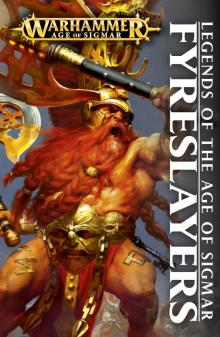 Fyreslayers
Fyreslayers One Night In Collection
One Night In Collection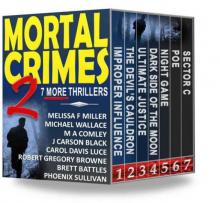 Mortal Crimes 2
Mortal Crimes 2 Some of the Best from Tor.com
Some of the Best from Tor.com Howl & Growl: A Paranormal Romance Boxed Set
Howl & Growl: A Paranormal Romance Boxed Set The Conan Compendium
The Conan Compendium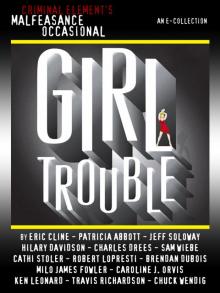 The Malfeasance Occasional
The Malfeasance Occasional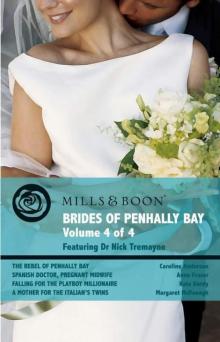 Brides of Penhally Bay - Vol 4
Brides of Penhally Bay - Vol 4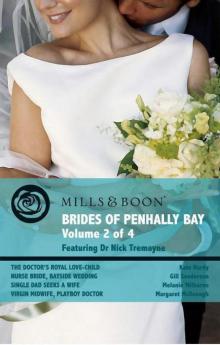 Brides of Penhally Bay - Vol 2
Brides of Penhally Bay - Vol 2 Brides of Penhally Bay - Vol 1
Brides of Penhally Bay - Vol 1 School's in Session
School's in Session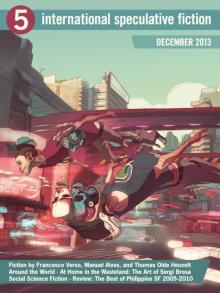 International Speculative Fiction #5
International Speculative Fiction #5 Erotic Classics I
Erotic Classics I Legends: Stories in Honor of David Gemmell
Legends: Stories in Honor of David Gemmell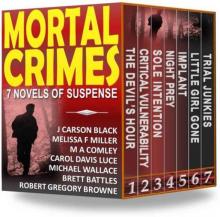 Mortal Crimes 1
Mortal Crimes 1 The Classic Children's Literature Collection: 39 Classic Novels
The Classic Children's Literature Collection: 39 Classic Novels Don't Read in the Closet volume one
Don't Read in the Closet volume one Some of the Best from Tor.com: 2014: A Tor.Com Original
Some of the Best from Tor.com: 2014: A Tor.Com Original The Fitzwarren Inheritance
The Fitzwarren Inheritance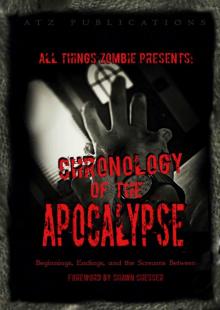 All Things Zombie: Chronology of the Apocalypse
All Things Zombie: Chronology of the Apocalypse Hammer and Bolter - Issue 12
Hammer and Bolter - Issue 12 Kiss Kiss
Kiss Kiss Dog Stories
Dog Stories Bad Blood Collection
Bad Blood Collection